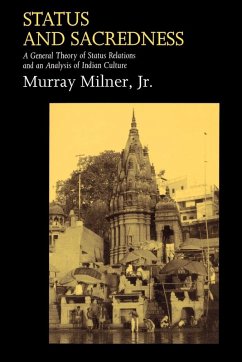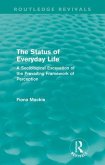Status and Sacredness provides a new theory of status and sacral relationships and a provocative reinterpretation of the Indian caste system and Hinduism. Milner shows how in India and many other social contexts status is a key resource, and that sacredness can be usefully understood as a special form of status. By analysing the nature of this resource Milner is able to provide powerful explanations of the key features of the social structure, culture, and religion. He argues against the widely held view that the Indian caste system is best understood as a unique cultural development, demonstrating that many of the seemingly exotic features are variations on themes common to other societies. Milner's analysis is rooted in a new theoretical framework called "resource structuralism" that helps to clarify the nature and significance of power and symbolic capital. The book thus provides a bold new analysis of India, an innovative approach to the analysis of religion, and an important contribution to social theory.
Analyzing a crucial case to convey a new theory is an honored tradition in social analysis. Marx analyzed England to explain the dynamics of capitalism, and Durkheim studied Australian aborigines to develop a theory of religion.In Status and Sacredness, Milner analyzes the Indian caste system and Hinduism to develop a general theory of status relationships. Moreover, he argues that sacredness and legitimacy are special forms of status and, hence, his theory also organizes much of what we know about political legitimation and religion -- as well as throwing new light on these subjects. The analysis is built upon in a new theoretical framework, "resource structuralism, " that clarifies the nature of power, the types of elites and nonelites, the significance of symbolic capital, and more generally the nature of social resources. This book will be essential reading for those interested in South Asian studies, social stratification, religion, and general social theory.
Hinweis: Dieser Artikel kann nur an eine deutsche Lieferadresse ausgeliefert werden.
Analyzing a crucial case to convey a new theory is an honored tradition in social analysis. Marx analyzed England to explain the dynamics of capitalism, and Durkheim studied Australian aborigines to develop a theory of religion.In Status and Sacredness, Milner analyzes the Indian caste system and Hinduism to develop a general theory of status relationships. Moreover, he argues that sacredness and legitimacy are special forms of status and, hence, his theory also organizes much of what we know about political legitimation and religion -- as well as throwing new light on these subjects. The analysis is built upon in a new theoretical framework, "resource structuralism, " that clarifies the nature of power, the types of elites and nonelites, the significance of symbolic capital, and more generally the nature of social resources. This book will be essential reading for those interested in South Asian studies, social stratification, religion, and general social theory.
Hinweis: Dieser Artikel kann nur an eine deutsche Lieferadresse ausgeliefert werden.









